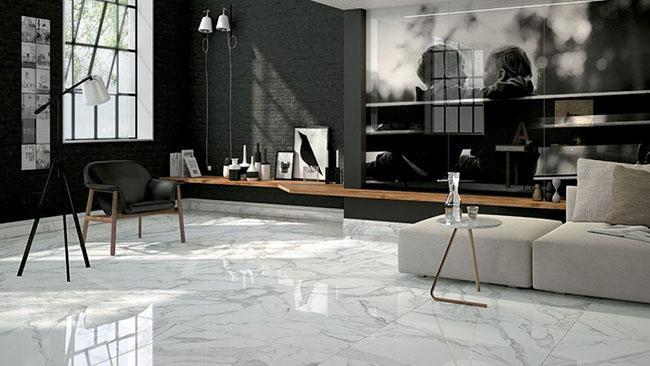You’ve just spilled a glass of red wine on your beautiful marble floors, and you know bleach can be a powerful cleaner, but is it safe for your luxurious stone? The answer, like many things in life, is: it depends. Marble is a porous stone, which means its surface has tiny holes that can absorb liquids, making cleaning a more delicate process. While bleach can be tempting for its cleaning power, it can also have damaging effects on your marble floors if not used correctly. Let’s delve into the complexities of this age-old cleaning dilemma.

Image: prohousekeepers.com
This article explores the intricacies of using bleach on marble floors, addressing safety concerns, alternative cleaning methods, and providing expert tips to keep your floors sparkling clean without causing harm. Ultimately, this guide will empower you to make informed decisions about your marble floors, ensuring they remain a beautiful and cherished part of your home.
The Risks of Using Bleach on Marble Floors
The main reason to be cautious about using bleach on marble is that it can damage the stone’s surface over time. Marble is a naturally occurring calcium carbonate, which can be dissolved by acidic substances. Bleach, while technically alkaline, contains chlorinated compounds that can react with the marble, causing etching or discoloration. This leads to dullness, a cloudy appearance, and even permanent staining if not handled carefully.
Not all marble is created equal. Some types, like honed marble, have a more porous surface, making them particularly susceptible to etching. Polished marble has a more protective layer, but it can still be affected by prolonged exposure to bleach.
When You Can (Maybe) Use Bleach
While generally discouraged, there are rare instances where using bleach on marble might be acceptable. Always proceed with extreme caution, using a very diluted solution and testing it in an inconspicuous area first.
- Diluted for Sanitizing: If you absolutely need to sanitize your marble floors due to a serious germ or bacteria concern, a very diluted bleach solution (1/4 cup bleach per gallon of water) can be used for spot cleaning. Never spray a large area at once, and rinse the surface immediately after cleaning.
- Specific Stain Removal: For difficult, non-organic stains, professional cleaning services may use bleach as part of their cleaning process. They have special equipment and expertise to safely manage bleach on marble, minimizing the risk of damage.
Safe Alternatives for Cleaning Marble Floors
Thankfully, there are many effective and safe alternatives to bleach for cleaning your marble floors. These methods are gentle on the stone while still achieving impressive results.
- Mild Soap and Water: A simple solution of mild dish soap and lukewarm water is often enough to remove dirt and grime from your marble floors. Use a soft-bristled brush or a microfiber mop for cleaning.
- Baking Soda: Baking soda is a natural cleaner that helps neutralize acids and gently scrub away stubborn stains. Make a paste with water and apply it to the stained area, allowing it to sit for a few minutes before scrubbing with a damp cloth.
- White Vinegar: White vinegar is an excellent natural cleaner for marble, acting as an effective degreaser and disinfectant. Dilute white vinegar with water (1:1 ratio) and use it to clean your floors. Avoid using undiluted vinegar, as it can be too acidic for marble.
- Commercial Marble Cleaners: A wide range of commercial cleaners specifically designed for marble are available. These formulas are carefully balanced to effectively clean and protect the stone. Always follow the manufacturer’s instructions for the best results.

Image: favoredstoneguides.com
Protecting Your Marble Floors from Damage
Prevention is key to keeping your marble floors looking their best. Here are some important steps to protect your floors from everyday wear and tear:
- Regular Cleaning: Sweeping or vacuuming your floors regularly with a soft-bristled brush attachment will help prevent dirt and grit from abrading the marble surface.
- Use Mats: Place mats at doorways and high-traffic areas to trap dirt and reduce wear.
- Avoid Harsh Chemicals: Stay away from abrasive cleaners, acidic cleaners like lemon juice or vinegar, and ammonia-based products, as they can all damage marble.
- Seal Your Floors: A sealant helps protect your marble from spills and stains. Regular sealing (every 1 to 2 years) will ensure your floors stay beautiful for longer.
Understanding Marble and its Unique Qualities
Marble is a metamorphic rock formed under immense pressure and heat. It is prized for its beauty and durability, but its porous nature can also make it susceptible to damage without proper care.
Characteristics of Marble:
- Porous: Marble has tiny pores, which makes it susceptible to stains and etching if not properly sealed.
- Sensitive to Acids: Marble reacts to acidic substances, causing etching or discoloration.
- Requires Regular Maintenance: Routine cleaning and sealing help prevent damage and maintain the beauty of your marble floors.
Consult Professionals for Complex Cleaning Needs
For serious stains, deep cleaning, or concerns about specific types of marble, it’s always best to consult a professional cleaning service. These experts have the knowledge, equipment, and experience to safely and effectively clean your marble floors, ensuring they remain in pristine condition for years to come.
Can I Use Bleach On Marble Floors
Final Thoughts
While you may be tempted to use bleach on your marble floors to achieve a sparkling clean, it’s crucial to understand the risks associated with this practice. Bleach can harm the surface of your marble, leading to etching, dullness, and discoloration. Instead, opting for safe and effective alternatives like mild soap and water, baking soda, and white vinegar will keep your floors clean and protected without damaging the stone.
By implementing a regular cleaning routine, using protective mats, and sealing your floors periodically, you can ensure your beautiful marble floors retain their elegance and shine for years to come. Remember, taking a preventative approach to cleaning and maintenance is the best way to preserve the beauty and integrity of your marble floors.

:max_bytes(150000):strip_icc()/OrangeGloEverydayHardwoodFloorCleaner22oz-5a95a4dd04d1cf0037cbd59c.jpeg?w=740&resize=740,414&ssl=1)




